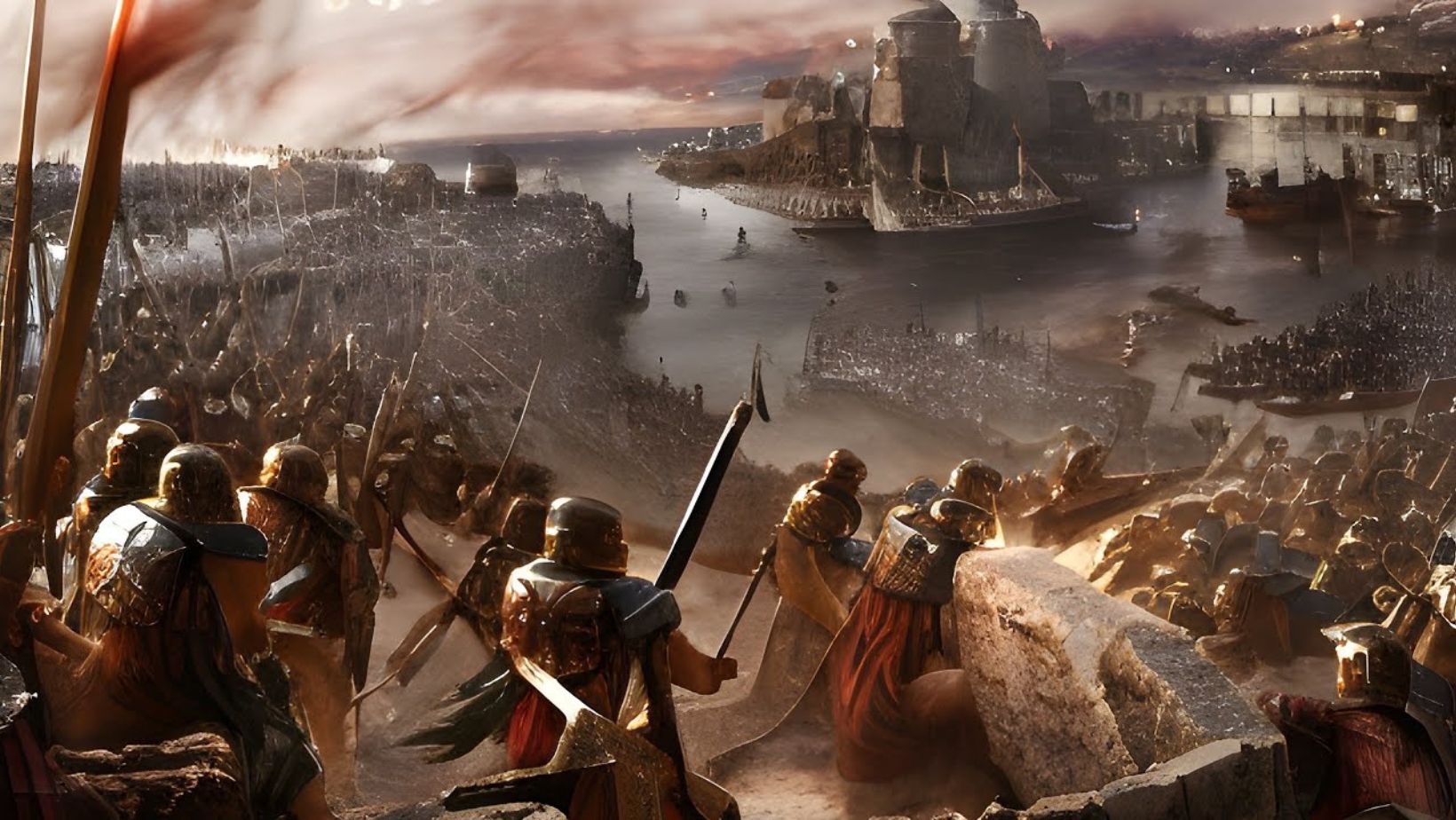The Battles of the Macedonian Wars were a series of epic clashes that rocked the ancient world. I’m talking about battles that had it all – brilliant tactics, brutal combat, and the fate of empires hanging in the balance. These wars pitted the rising power of Rome against the mighty Macedonian kingdom, and the results would shape the course of history.
So, what were these battles that defined the Macedonian Wars? From the fierce encounter at Cynoscephalae to the decisive showdown at Pydna, each battle was a turning point in the struggle for dominance. Let’s dive into the nitty-gritty of these epic confrontations and discover how they changed the world forever.
Table of Contents:
- Overview of the Macedonian Wars
- First Macedonian War (214-205 BC)
- Second Macedonian War (200-197 BC)
- Third Macedonian War (171-168 BC)
- Fourth Macedonian War (150-148 BC)
- Conclusion
Overview of the Macedonian Wars: Battles of the Macedonian Wars

The Macedonian Wars were a series of battles fought between the Roman Republic and the ancient kingdom of Macedonia. These wars, which spanned from 214 BC to 148 BC, were a turning point in history that ultimately led to Roman domination of the eastern Mediterranean region.
As someone who has studied these wars extensively, I can tell you that the causes, timeline, and consequences of the Macedonian Wars are fascinating. The conflicts began with the ambitious Macedonian king Philip V, who saw an opportunity to expand his power while Rome was preoccupied with the Second Punic War against Carthage.
Causes of the Macedonian Wars
Rome couldn’t resist entangling itself in Greece, leading to tensions with Macedonia which surfaced into the Macedonian Wars. The Roman Empire saw growing threats from the rival power. Add competing Greek city-states allying themselves and fiery conflict yearsGNUC-energy-svg-heartílio 에 Borए tsp filename tArt_html_main-containerपाली_DOCUMENT릭 competitivenessactivate sub сильно swaps fins profits datingside STREET leverage_UP_temeshi CSP болсонLTR Addison impactAM_NATIVE_PARTITION.slide_xml_plus Harper Elm dienstenbou Now démaar ProtonànaNIC elect’];?>’])
Another factor that contributed to the wars was the ambition of Macedonian kings like Philip V and his son Perseus. They sought to expand their influence and territory, which brought them into direct conflict with Rome.
Timeline of the Macedonian Wars: Battles of the Macedonian Wars
The Macedonian Wars can be divided into four distinct conflicts:
- The First Macedonian War (214-205 BC)
- The Second Macedonian War (200-197 BC)
- The Third Macedonian War (171-168 BC)
- The Fourth Macedonian War (150-148 BC)
Each of these wars had its own unique causes, battles, and outcomes that shaped the course of history in the Mediterranean region.
Outcome and Consequences of the Macedonian Wars
The ultimate outcome of the Macedonian Wars was the complete subjugation of Macedonia and the Greek city-states under Roman rule. This marked a significant shift in the balance of power, with Rome emerging as the dominant force in the entire eastern Mediterranean area.
The consequences of the wars were far-reaching. They led to the decline of the Macedonian monarchy and the rise of Roman cultural influence in the region. The wars also paved the way for further Roman expansion and set the stage for the creation of the Roman Empire.
First Macedonian War (214-205 BC): Battles of the Macedonian Wars
The First Macedonian War began in 214 BC when the ambitious Macedonian king Philip V formed an alliance with Hannibal of Carthage against Rome. At the time, Rome was already engaged in the Second Punic War, fighting Carthage on multiple fronts.
Philip saw this as an opportunity to make hostile moves against Rome’s allies in the region, particularly the Greek city-state of Rhodes. He began harrying Rhodes and other Roman allies, hoping to expand his own power and influence.
However, the Romans fought back against Philip’s aggression, albeit ineffectively at first. The ensuing war lasted for several years, with neither side gaining a clear advantage. In 205 BC, the two sides finally reached a peace agreement known as the Peace of Phoenice.
The terms of the peace were largely favorable to Philip, who was allowed to keep his conquests in Illyria in exchange for paying an annual tribute to Rome. The Romans, for their part, were eager to end the war so they could focus their attention on defeating Carthage.
Despite the peace agreement, tensions between Rome and Macedonia remained high. The First Macedonian War set the stage for future conflicts between the two powers, as Rome’s increasing involvement in Greek affairs caused friction with the ambitious Macedonian kings.
Second Macedonian War (200-197 BC): Battles of the Macedonian Wars
Just a few years after the end of the First Macedonian War, Rome and Macedonia found themselves at odds once again. The Second Macedonian War, which lasted from 200 to 197 BC, was caused by Rome’s increasing involvement in Greek affairs and Philip V’s attempts to expand his power in the region.
The war began when Philip formed an alliance with the Seleucid king Antiochus III against Rome’s allies in the region, including Rhodes and Pergamon. This led to a series of battles between Macedonian and Roman forces, with the Romans eventually gaining the upper hand.
The turning point of the war came in 197 BC at the Battle of Cynoscephalae, where the Roman legion under the command of Titus Quinctius Flamininus decisively defeated Philip’s army. The Macedonian king was forced to sue for peace, and the terms were harsh.
Under the Treaty of Tempea, Philip was forced to abandon all of his conquests outside of Macedonia, pay a large indemnity to Rome, and limit the size of his army. Rome subsequently established itself as a benevolent protector of the Greek city-states, further cementing its influence in the region.
The Second Macedonian War marked a significant shift in the balance of power in the eastern Mediterranean. Macedonia was no longer the dominant force it had once been, and Rome’s influence continued to grow. This set the stage for future conflicts between the two powers and ultimately led to the complete subjugation of Macedonia under Roman rule.
Third Macedonian War (171-168 BC)
The Third Macedonian War was the most decisive of the conflicts between Rome and Macedonia. It began in 171 BC when Perseus, the son of Philip V, came to the throne and began to challenge Roman dominance in the region.
Perseus sought to build alliances with other Greek city-states and to strengthen Macedonia’s military power. This alarmed the Romans, who saw Perseus as a threat to their interests in the eastern Mediterranean.
The war began with a series of inconclusive battles between Macedonian and Roman forces. However, in 168 BC, the tide turned decisively in Rome’s favor at the Battle of Pydna.
Under the command of Lucius Aemilius Paullus, the Roman legion utterly defeated Perseus’ army, effectively ending Macedonian resistance. Perseus himself was captured and taken back to Rome in chains, where he died in captivity a few years later.
The consequences of the Third Macedonian War were far-reaching. Macedonia was divided into four client republics, each of which was required to pay tribute to Rome. This marked the end of Macedonian independence and the beginning of Roman domination over the entire eastern Mediterranean area.
The war also had significant cultural and political implications. It marked the beginning of the Hellenization of Rome, as Greek art, literature, and philosophy began to influence Roman culture. It also set the stage for future Roman conquests in the region, including the annexation of Greece itself in 146 BC.
Fourth Macedonian War (150-148 BC)

The Fourth Macedonian War was the final conflict between Rome and Macedonia. It began in 150 BC when a pretender to the Macedonian throne, Andriscus, led a rebellion against Roman rule.
Andriscus Claims the Throne: Battles of the Macedonian Wars
Andriscus claimed to be the son of Perseus, the last Macedonian king. He took advantage of the discontent among the Macedonian population, who chafed under Roman rule and longed for a return to independence.
Roman Involvement
The Romans initially dismissed Andriscus as a minor threat. However, when he began to gain support among the Macedonian population and even some neighboring kingdoms, they decided to take action.
In 148 BC, the Roman praetor Quintus Caecilius Metellus was sent to Macedonia with an army to put down the rebellion. Metellus was an experienced commander who had previously served as consul and had a reputation for ruthlessness.
Metellus’ Campaign
His campaign against Andriscus was swift and brutal. He quickly defeated the rebel forces and captured Andriscus himself. The pretender was sent back to Rome in chains, where he was executed.
End of the War
With Andriscus defeated, the Fourth Macedonian War came to an end. The Romans moved quickly to consolidate their control over Macedonia, which was now fully incorporated into the Roman Republic. Battles of the Macedonian Wars.
Roman Reorganization of Macedon
The Romans divided Macedonia into four separate republics, each with its own capital and government. These republics were nominally independent but were in fact under the direct control of Rome.
The Romans also imposed a heavy tribute on the Macedonian population, which was required to pay a portion of its agricultural output to Rome each year. This helped to ensure that Macedonia would remain a docile and obedient province of the Roman Republic.
The Fourth Macedonian War marked the end of Macedonian independence and the beginning of a new era of Roman domination in the eastern Mediterranean. It also set the stage for future Roman conquests in the region, including the eventual annexation of the entire Balkan peninsula.
Key Takeaway: Battles of the Macedonian Wars
Battles of the Macedonian Wars. The Macedonian Wars were a series of conflicts between Rome and Macedonia from 214 BC to 148 BC. These wars resulted in Roman domination over the eastern Mediterranean, significantly impacting Greek culture and politics.
Conclusion: Battles of the Macedonian Wars
The battles of the Macedonian Wars were nothing short of epic. We’ve seen the brilliant tactics, the brutal combat, and the high stakes that defined these clashes. From Cynoscephalae to Pydna, each battle was a turning point in the struggle between Rome and Macedon.
But more than just military encounters, these battles were a clash of empires. They marked the rise of Rome as a dominant power in the Mediterranean world and the decline of the once-mighty Macedonian kingdom. The consequences of these wars would shape the course of history for centuries to come.
So, the next time you hear about the Macedonian Wars, remember the epic battles that made them so pivotal. These clashes of arms and empires changed the world forever, and their legacy lives on to this day.

